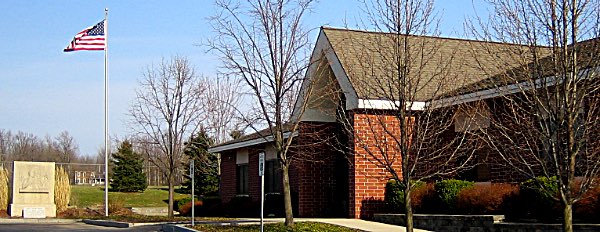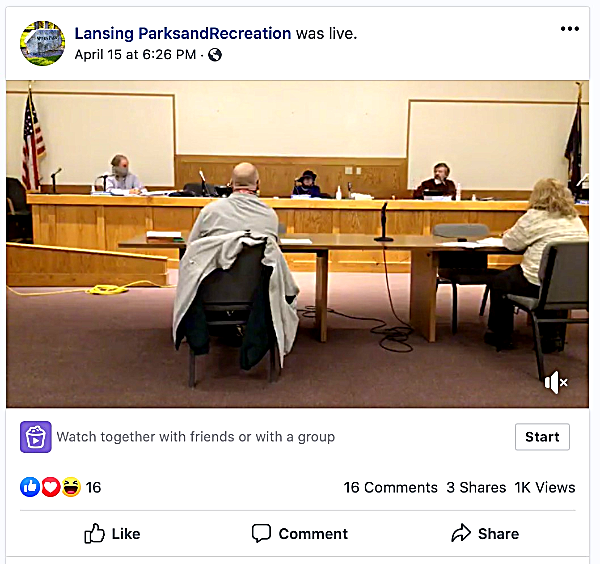- By Dan Veaner
- News
 Print
Print 
Social distancing rules and state mandates that close down in-person public meetings during the coronavirus pandemic have presented a special challenge for municipalities. The Lansing Town Board livestreamed its regular March and April meetings on Facebook with mixed results. The picture was just OK, and it was very hard to hear what people were saying. There was some improvement in sound in the April meeting, but some board members were unintelligible. Now that a new camera and livestreaming software has been installed, Town officials are hoping the third time will be the charm.
"Picture quality and sound should be improved but it's a work in progress," says Parks and Recreation Supervisor Patrick Tyrrell, who also manages computer and technical projects for the Town. "We're still learning. Private computers are the real issue with sound quality for the past couple meetings. That's out of my control. The last meeting was better with the use of speakers but one computer in particular had very poor sound quality. Again, it's a process we are working through, we'll get better each month."
The Town of Lansing invested just under $4,500 in a camera and system that should make the online experience much better. The camera is able to integrate with the sound system in the courtroom, so that board members and town officials who are physically present will be heard much more clearly.
Tyrrell says Hiway HiFi did "a fantastic job of installing the equipment". The camera plugs directly into the sound board, which should result in much clearer souond. It has the capability to pan, zoom, and tilt. It has a number of fixed positions, or someone can operate it to focus on speakers in the room. The camera comes with software that enables livestreaming to the Lansing Parks and Recreation Facebook Page. He says the Town is still working on issues with using Zoom.
The Village of Lansing and the Lansing School District have had pretty good success holding open meetings on Zoom. People interested in attending get the meeting ID and password beforehand, and log into the meeting. The school district has also been posting an audio file of the meetings on the school Web site for those who can't attend the livestreamed meetings. But the Village recording was not posted, as Zoom does not automatically do that as Youtube and Facebook do. Both the Village and Town have cancelled recent Planning Board meetings, although the Town Planning Board did conduct a test Zoom meeting that was also on Youtube.
But Lansing Supervisor Ed LaVigne says that Zoom is not a good solution for the Town Board because board members Andra Benson and Joseph Wetmore are not able to log in remotely from their homes. Parenthetically he notes that the Town has created a new Broadband Committee that he hopes will improve Internet availability in rural portions of the Town that are not adequately covered right now.
"We have two board members that can't do it from home," LaVigne says. "So it looks like from now on we're probably meeting here with at least three board members. That may be a moot point if the executive order (restricting in-person gatherings) is not extended."
Public hearings are another issue that the Town Board is struggling to address. While some public hearings can be postponed in the hope that restrictions will be lifted, the need for a public hearing on a local law to regulate large solar and wind projects has become more urgent. Lansing Director of Planning C.J. Randall said at the April Town Board meeting that Albany is uncharacteristically planning on instituting new rules for large scale renewable energy projects, overriding home rule of local municipalities.
"It's very strange for for a complete segment of the economy essentially to be preempted by the state or federal government, especially in our home rule state," Randall said. "So this is very new territory for everyone."
Town officials have been working on a local law for many months now, attempting to balance the Town's desire to protect farm land in the rural northern portion of Lansing. While the town government wants to encourage medium sized solar projects in particular, the prime locations for such projects also happen to be on some of the best farmland in Tompkins County, because power lines originating from the now-closed power plant cut a swarth across the Town as they wend southeast. These power lines provide ideal hookup points for solar farms because they were designed to carry electricity into the grid.
Randall recommended putting a local law in place before the State institutes Article 23 anyway, because it would give the Town some tools when large projects want to locate in Lansing. But with the technical challenge of holding public hearings online LaVigne asked her what the worst case scenario would be if a project chose to locate here before new town and state regulations can be enacted.
"That use is currently allowed in the zoning," Randall said. "Commercial and residential solar uses are currently allowed. However, we certainly can use the site planning standard as a guide to help a process like that. That said we're essentially are now preempted once the Department Of State promulgates the rules under Article 23, which is a new version of Article 10."
The upshot was that the wind and solar law public hearing was postponed, at least until the May meeting. LaVigne said that if restrictions aren't lifted soon the Town will have to figure out a way to safely get public reaction to the proposed local law.
"Let's keep an open mind," he said. "If things move forward where we can implement a public hearing as we did before, then let's move forward. But if it is still the same a month from now or two months from now, then maybe we're going to have to revisit how we implement this to get it moving forward."
Previously Town Board meetings were recorded and later posted on Youtube. But the pandemic social distancing rules seem to be increasing public interest in Lansing municipal meetings. He notes that being able to attend meetings from home has already increased public engagement.
"On a positive note, there have been many more people viewing the last couple of meetings than ever before," Tyrrell says. "Hopefully the pandemic restrictions will be lifted soon, we will continue to live stream meeting once they are lifted, gives more of the public a chance to be involved in local government."
Tyrrell says the new camera will be used for Planning and Zoning Board meetings as well as Town Board meetings, and that he plans to livestream the meetings even after the coronavirus restrictions are lifted. An advantage of livestreaming on Facebook and Youtube is that the video remains on the page after the live meeting has concluded. People can attend and comment while the meeting is happening, or view it after the fact.
LaVigne says that any way the Lansing public can access the meetings is OK with him, as long as people can hear what is being said.
"I don't want to take the place entirely of active participation," he says. "Some things like public hearings you still need to be public, and you need to be present. So those are things that all options are on the table to be considered. I think in the future probably more and more of the meetings will be livestreamed. I don't think there's anything wrong with that. But on the other hand, we'll see as we evolve with the systems, we'll see what the capabilities are and what the comfort levels are and what the legal terms are."
v16i19




